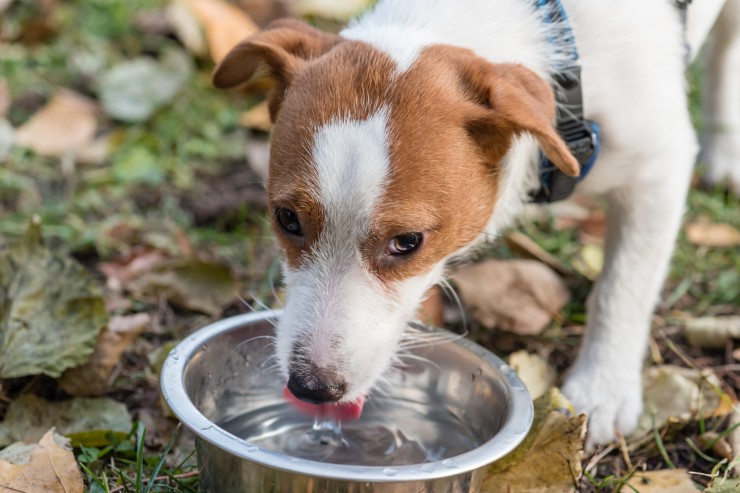

Not all horses need to be given electrolytes, but some do benefit from being given them especially if they are in hard or intensive work. The average riding horse can replenish electrolyte levels themselves when fed a balanced diet that consists of good grazing, top quality hay, ample access to fresh water and a salt block, but if they are competing, the chances are they will need some help getting their electrolyte levels back to normal.
Electrolytes regulate water content in the body. It's these molecules that generate electrical charges through membranes found in the body which serve to transmit nerve pulses and keep muscle function working properly. Synthetically produced electrolyte supplements are made up of sodium chloride, calcium, potassium and magnesium with some containing glucose too. They come in powders and pastes which are particularly useful when a horse refuses to eat or drink anything. The paste stimulates the need to drink which helps speed up a horse's recovery when they're dehydrated and their levels of electrolytes have dropped too low.
Soluble electrolytes can be added to a water bucket, but equine nutritionists and vets recommend that horses have access to a second bucket without the supplement added to it because some horses can be funny about drinking water with any sort of supplement in it. The problem is that horses will generally turn their noses up at any new smell or taste, so when choosing an electrolyte supplement it's important to select one that tastes “good”.
Powdered electrolyte supplements should be salty tasting and not a sweet. Many supplements on the market contain certain flavourings which are supposed to make them more palatable, but this makes them too sweet and studies have shown that although a little sugar enhances sodium absorption in the body, too much dextrose or some other form of sugar can mess up a horse's osmotic balance. It can also interfere with their fluid levels and as a result throw them off balance making things worse rather than better.
The most important thing is for a horse to be given a clean bill of health before you consider supplementing their diet with any electrolytes. A vet or equine nutritionist would look closely at every aspect of a horse's diet, their workload and overall condition before recommending whether or not they would benefit from being given electrolytes or whether it would be a waste of money and end up doing more harm than good.
Horses with healthy kidney function are more than capable of regulating and balancing things out should they be given too many electrolytes, but there are certain situations where a problem could arise which is especially true if a horse is suffering from any sort of kidney damage or they don't have free access to fresh clean water that does not contain any supplements. If a horse doesn’t drink enough fresh, clean water that doesn’t contain electrolytes it could negatively impact their kidneys causing all sorts of health issues.
Horses sweat up in trailers or horse boxes and more especially if they are new to travelling and therefore nervous. A horse will typically have a few bowel movements on short or long trips, which means they lose a lot more water and electrolytes. Even when a healthy horse is competing they endure a certain amount of stress when travelling and being away from “home”, add this to warmer weather conditions, their exertion when competing and it can really take its toll on electrolyte levels causing certain imbalances which need to be replenished. In short, they would very likely benefit from being given a supplement and one that's recommended either by a vet or equine nutritionist.
As a rule of thumb, most horses get enough electrolytes when fed a well thought out balance diet and there are certain dangers associated with supplementing a diet with too many especially if a horse is suffering from specific health issues. However, if a horse is being fed a hay-only diet, they may well benefit from having free access to a salt block to compensate for any electrolyte deficiencies associated with forage only diets.
As previously mentioned if a horse has any kidney issues, they would have a much harder time processing any extra electrolytes added to their diets. With this said, if a horse is suffering from any sort of kidney complaint, the chances are their performance would be very poor and they would not be able to exert themselves to any great extent. As such, the chances are they would not be suffering from any deficiencies as long as they are fed a well balanced diet that is.
If you are competing this season, the chances are your horse would benefit from being given an electrolyte supplement. However, it's best to stay away from any that have “flavourings” added to them and to stick with one that either a vet has recommended or which has a salty taste to it. The other option is to make sure your horse has free access to a salt block as well as fresh, clean water. Horses on hay-only diets would also benefit from being given electrolytes and again salt blocks are a great way of ensuring they replenish any losses as needed. However, not all horses need to have their diets supplemented with electrolytes and it's a good idea to have your horse checked over by a vet and be given a clean bill of health before deciding to go down this route.
 What Drinks Can Dogs Have Apart From Water?
What Drinks Can D
What Drinks Can Dogs Have Apart From Water?
What Drinks Can D
 Great Pyrenees Grooming Tips – Special Techniques for Large Breed Dogs
Great Pyrenees Grooming Tips – Special Techniques for Large Breed Dogs
 Caring For Your Rabbits During The Winter
Caring For Your R
Caring For Your Rabbits During The Winter
Caring For Your R
 Introducing Your New Puppy To Your Resident Dog
Introducing Your
Introducing Your New Puppy To Your Resident Dog
Introducing Your
 How To Stop Your Cat From Scratching Indoors
How To Stop Your
How To Stop Your Cat From Scratching Indoors
How To Stop Your
Copyright © 2005-2016 Pet Information All Rights Reserved
Contact us: www162date@outlook.com